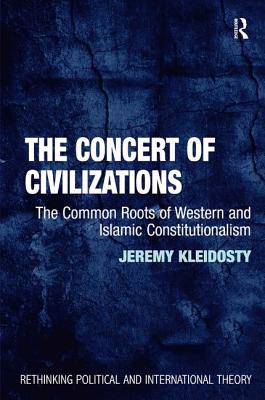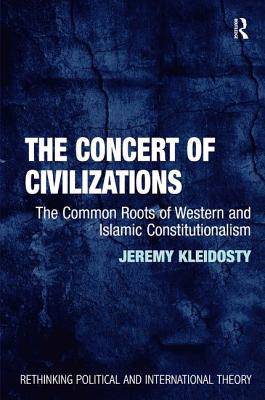
Door een staking bij bpost kan je online bestelling op dit moment iets langer onderweg zijn dan voorzien. Dringend iets nodig? Onze winkels ontvangen jou met open armen!
- Afhalen na 1 uur in een winkel met voorraad
- Gratis thuislevering in België vanaf € 30
- Ruim aanbod met 7 miljoen producten
Door een staking bij bpost kan je online bestelling op dit moment iets langer onderweg zijn dan voorzien. Dringend iets nodig? Onze winkels ontvangen jou met open armen!
- Afhalen na 1 uur in een winkel met voorraad
- Gratis thuislevering in België vanaf € 30
- Ruim aanbod met 7 miljoen producten
Zoeken
The Concert of Civilizations
The Common Roots of Western and Islamic Constitutionalism
Jeremy Kleidosty
€ 182,45
+ 364 punten
Uitvoering
Omschrijving
Are Western and Islamic political and constitutional ideas truly predestined for civilizational clash? In order to understand this controversy The Concert of Civilizations begins by deriving and redefining a definition of constitutionalism that is suitable for comparative, cross-cultural analysis. The rule of law, reflection of national character, and the clear delineation and limitation of governmental power are used as lenses through which thinkers like Cicero, Montesquieu, and the authors of The Federalist Papers can be read alongside al-Farabi, ibn Khaldun, and the Ottoman Tanzimat decrees. Bridging the civilizational divide is a chapter comparing the Magna Carta with Muhammad'sConstitution of Medina, as both documents can be seen as foundational within their traditions. For the first time in political theory, this text also provides a sustained, detailed analysis of Khayr al-Din al-Tunisi's book The Surest Path, which explains his fusion of Muslim and Western ideas in his writing of Tunisia's first modern constitution, which is also the first constitution for a majority-Muslim state. Finally, the book discusses the Arab Spring through a brief overview of the revolutions in Egypt, Libya, and Tunisia, and offers some early thoughts about Tunisia's uniquely successful revolution.
Specificaties
Betrokkenen
- Auteur(s):
- Uitgeverij:
Inhoud
- Aantal bladzijden:
- 240
- Taal:
- Engels
- Reeks:
Eigenschappen
- Productcode (EAN):
- 9781472414809
- Verschijningsdatum:
- 28/06/2015
- Uitvoering:
- Hardcover
- Formaat:
- Genaaid
- Afmetingen:
- 156 mm x 233 mm
- Gewicht:
- 599 g

Alleen bij Standaard Boekhandel
+ 364 punten op je klantenkaart van Standaard Boekhandel
Beoordelingen
We publiceren alleen reviews die voldoen aan de voorwaarden voor reviews. Bekijk onze voorwaarden voor reviews.











